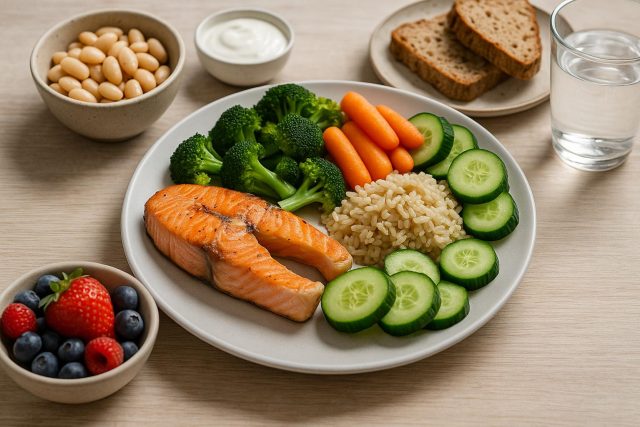Living with Crohn’s disease can feel like navigating an unpredictable path, especially when it comes to food. While there is no one-size-fits-all diet, understanding the principles of a healthy Crohn’s disease diet can empower you to manage symptoms and enhance your quality of life. So, what can you eat without triggering a flare-up?
Table of Contents
- Understanding Crohn’s Disease and Nutrition
- Safe Food Choices During Remission
- What to Eat During a Flare-Up
- Special Diets and Supplements
- Tips for Long-Term Success
Understanding Crohn’s Disease and Nutrition
Crohn’s disease is a chronic inflammatory bowel disease (IBD) that primarily affects the digestive tract. Because inflammation can occur anywhere from the mouth to the anus, food absorption becomes a major concern. That’s why a well-balanced Crohn’s disease diet plays a crucial role in symptom management.
Inflammation, ulcers, and strictures can all affect how your body processes food. While no food causes Crohn’s directly, certain items can worsen symptoms. Conversely, some choices can support digestion and help maintain remission. For this reason, personalizing your diet with the help of a dietitian is essential.
Safe Food Choices During Remission
When Crohn’s is in remission, your goal is to nourish your body without triggering new symptoms. Therefore, choosing nutrient-rich, easily digestible foods is a top priority.
Recommended Foods:
- Lean proteins like poultry, fish, eggs, and tofu support tissue repair.
- Low-fiber fruits and vegetables, such as bananas, peeled apples, carrots, and squash, are easier on the gut.
- Refined grains like white rice, pasta, and sourdough bread can be less irritating than whole grains.
- Healthy fats, including olive oil and avocado, provide energy without triggering inflammation.
- Lactose-free or low-lactose dairy products, like lactose-free milk or aged cheeses, are better tolerated.
Additionally, hydration is key. Drinking enough water helps prevent constipation and supports nutrient absorption. However, avoid sugary sodas and alcohol, which can worsen inflammation.
What to Eat During a Flare-Up
Flare-ups present a different challenge. Inflammation increases, and symptoms like diarrhea, pain, and fatigue become more severe. During this time, a modified Crohn’s disease diet that reduces irritation is critical.
Best Foods During a Flare:
- Plain, low-fiber carbohydrates such as white rice, mashed potatoes, and saltine crackers.
- Cooked vegetables that are peeled and de-seeded, like carrots and zucchini.
- Broths and soups, which are soothing and hydrating.
- Smooth nut butters, like peanut or almond butter, which offer protein and calories.
- Well-cooked lean meats or fish to minimize digestive strain.
Avoid high-fiber, spicy, or greasy foods during flares. Beans, whole nuts, popcorn, and raw veggies can irritate the digestive tract. Keeping a food journal during these times helps identify specific triggers.
Special Diets and Supplements
Several structured diets have shown promise in managing Crohn’s. Although these plans vary, they share common goals: reduce inflammation, improve digestion, and promote nutrient absorption.
Notable Diets:
- Low-FODMAP Diet: Reduces fermentable sugars that may cause gas and bloating.
- Specific Carbohydrate Diet (SCD): Limits complex carbs and processed foods.
- Mediterranean Diet: Emphasizes whole foods, healthy fats, and lean proteins.
Each person responds differently, so it’s essential to consult a healthcare provider or nutritionist before adopting a new regimen. You can also explore additional dietary insights in HealingWell’s top articles.
In addition to diet, nutritional supplements may be necessary. Crohn’s patients are often deficient in:
- Iron
- Vitamin B12
- Vitamin D
- Calcium
Always consult a medical provider before starting supplements. Overuse can cause more harm than good. For tailored care, consider seeking a second opinion through platforms like Healthcare.pro.
Tips for Long-Term Success
Living well with Crohn’s means planning, adapting, and staying informed. Here are strategies to help you succeed with your Crohn’s disease diet:
- Keep a food diary: Document meals and symptoms to identify patterns.
- Eat smaller, more frequent meals: This puts less strain on your digestive system.
- Stay hydrated: Aim for 8-10 cups of fluid daily, unless otherwise advised.
- Cook your food thoroughly: Especially meats and vegetables.
- Minimize stress: Stress can worsen symptoms, so consider meditation or gentle exercise.
Most importantly, be patient with yourself. Your needs may change over time, and setbacks are part of the journey. Collaborating with a gastroenterologist and registered dietitian can provide personalized support.
Conclusion
Understanding what to eat on a Crohn’s disease diet doesn’t have to feel overwhelming. With the right knowledge and support, you can make choices that reduce symptoms, support healing, and promote better health. Whether in remission or facing a flare-up, knowing which foods nourish rather than irritate can help you take control of your well-being.
Over time, dietary planning becomes second nature. Just remember, small, consistent steps often lead to the greatest long-term gains.
FAQs
Can I eat dairy with Crohn’s disease?
Some people tolerate lactose-free or low-lactose dairy. Experiment and monitor your body’s response.
Are fiber-rich foods bad for Crohn’s?
During flares, high fiber can irritate the gut. However, some people in remission benefit from soluble fiber.
Is a gluten-free diet necessary for Crohn’s?
Not usually. Unless you have celiac disease or gluten sensitivity, there’s no need to avoid gluten.
Should I take probiotics?
Some patients find relief with probiotics, but results vary. Always discuss with your doctor first.
Are there foods I should always avoid?
Raw vegetables, popcorn, seeds, and fatty or spicy foods often trigger symptoms, especially during flares.
Disclaimer
This content is not medical advice. For any health issues, always consult a healthcare professional. In an emergency, call 911 or your local emergency services.
